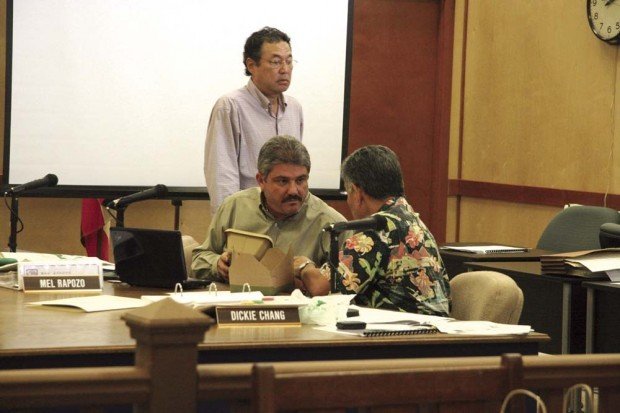NAWILIWILI — Community members on Wednesday packed Council Chambers in Nawiliwili, voicing their views on a bill that would carve new exemptions in the county’s plastic bag ban.
While many residents have cheered Kaua‘i’s law banning plastic bags from checkout points at retail stores, some food industry professionals are saying the environmental gains come at the cost of potential health issues.
Restaurant owners and others who work in the industry say they only realized the potential consequences of Ordinance 885 after the bill went into effect Jan. 11. The council passed the bill Oct. 12, 2009.
Kaua‘i County Councilman Mel Rapozo on Feb. 9 introduced an amendment to exempt businesses that sell ready-to-eat food. He said many people had approached him with health-related concerns.
“Paper bags and reusable bags increase opportunity for cross-contamination for ready-to-eat foods,” said Allen Okuhara, co-owner of Mark’s Place in Puhi.
Okuhara said when food contamination happens, it affects the business.
“I don’t want to gamble with the health and safety of the beautiful people of Kaua‘i,” he said.
Okuhara also said many of his customers complain because once food gets into contact with paper bags, the bags rip easily, causing the food to fall on the ground.
“We feel bad for them, so we just make them another plate lunch, which costs us money.”
On the other side of the issue, supporters of the ban frowned at the proposal, despite the amendment still requiring food establishments to carry biodegradable plastic bags. The proposed legislation defines “biodegradable bag” as a bag made of a degradable plastic in which the degradation is caused by naturally occurring microorganisms.
“Please do not allow us to go backwards,” said Kapa‘a resident Pat Gegen, adding that the Environmental Protection Agency recognized the council for the plastic ban.
Councilwoman JoAnn Yukimura said she was not convinced of health issues related to reusable bags. She said she has seen only one study about it, and that study was sponsored by an oil company, leading her to question the findings.
“But I am concerned about the concern raised by the food establishments about the spillage of gravy and liquids,” she said.
Gegen said there are alternatives to bringing back plastic to food establishments. He cited a business at Kukui Grove Center that serves food and drinks in 100 percent biodegradable containers, which were tighter than Styrofoam.
Pua Vidinha said her main concern is sanitation, but pointed out that paper bags require more fuel than plastic bags to be manufactured.
Vidinha pulled out a small plastic bag and held it up to council members. She said she found it in a local supermarket, offered at the donuts section.
“If the supermarkets are allowed these for donuts, then we should be allowed to use these for our food service,” Vidinha said.
Kapa‘a resident Ken Taylor brought samples of paper and biodegradable containers to back up his argument that there are alternatives.
“The problem that I see in here is that the food industry is just refusing to take the simple steps of making the minor changes that need to take place and moving forward with the existing bill,” Taylor said. “The environment can live without people, but people cannot live without the environment.”
Kaua‘i Monk Seal Watch Program Vice President Bob Bradley said plastic bags impact marine life. He urged council members to leave the bill as is.
“I don’t think there’s probably anybody in this room who has seen a turtle who has tried to swallow a plastic bag, or a little pup monk seal who has gotten tangled up in a plastic bag,” Bradley said. “That’s virtually a drowning.”
Connie Clausen said people have a hard time changing habits.
“Many of us agree that this issue is not about bacteria, it’s about convenience,” she said.
Major fast-food retailers on Kaua‘i switched to paper, but she said she understands the difficulties of smaller businesses that cannot just call corporate offices and switch supplies.
“We need to come up with solutions,” Clausen said.
Liability concerns were also raised.
“If by chance someone does get ill, and we do find a correlation, does the county accept the responsibility?” Hanapepe resident Doris Yahayashi said. “It’s the people of Kaua‘i who is going to be responsible, because we support the government.”
Yahayashi said she believes the people should have the choice of whether using plastic bags or recyclable bags.
Community leader Jimmy Trujillo asked the county for a deferral.
“Let’s give it a critical amount of time, and then come back and review it and look at ways that we can improve the bill, ways that we can improve the strategies to reduce the impacts on our landfill,” he said.
On March 16 the bill will go to committee.
Go to www.kauai.gov for more information.
• Léo Azambuja, staff writer, can be reached at 245-3681 (ext. 252) or lazambuja@kauaipubco.com.





